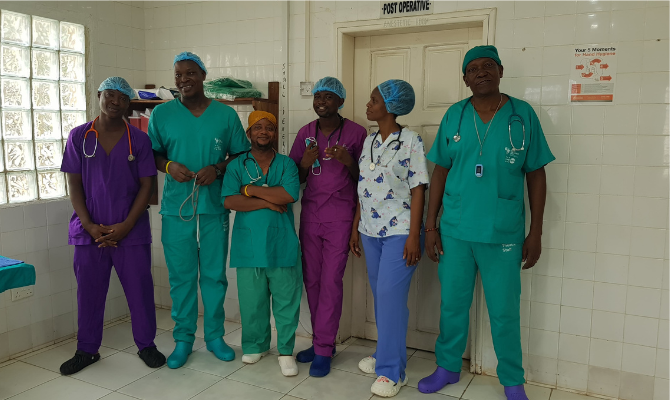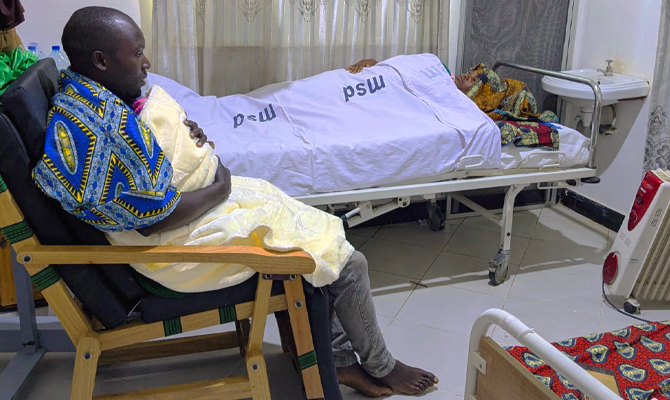Holy Spirit Hospital is a General Hospital situated in the City of Makeni, Bombali District, Sierra Leone. The facility, which has a bed capacity of 55, serves an estimated population of 102,648 offering various health services including Obstetrics, Gynaecology, Paediatrics, Medicine, General Surgery, and Specialist Surgery. Other services provided by the Hospital include an Outpatient Department, a Diabetes Unit, Physiotherapy Unit, HIV/AIDS Unit. Although the city is served by other health facilities, the Holy Spirit Hospital is recognised and appreciated by health institution due to the high quality standard of its services, dedication and competence of its staff. Doctors with Africa CUAMM started working in the facility in 2005 and it is committed to reducing maternal mortality and morbidity in the district.
In the framework of the activities implemented by CUAMM and funded by Manos Unidas, the Holy Spirit Hospital has recently welcomed 77 health professionals from 5 different facilities, namely Princess Christian Maternity Hospital – PCMH, Bo Government Hospital, Makeni Government Hospital, Pujehun Maternity Hospital and the newly appointed staff for HDU from Holy Spirit Hospital, to attend a 4-day training on critical care. The training was meant to improve the quality of critical care services in 5 HDU’s, improve skills and practice in basic life support and emergency preparedness, improve management of obstetric emergency crises, increase knowledge and skill on intravenous line technique and complications as well as increase the competency of staff in the management of hypertensive disorders, severe pre-eclampsia and eclampsia.
«The training gave health professionals the occasion to meet for the first time and share their experience. They participated with enthusiasm and showed an extremely collaborative attitude – said Hannah Godon CUAMM Project Manager. Participants had different profiles and expertise, some of them had never worked on emergency preparedness before while others, like the senior nurses from PCMH had a long experience. This was quite a challenge but also a value for their learning experience».

In addition, activities include supervision and on-the-job training and provisions of equipment for the establishment of a new 2 bedded HDU in Holy Spirit Hospital, as well as supplies of laboratory reagents in order to support diagnostic services. As a result, the project aims to facilitate access to critical care services for 945 women and provide diagnostic services to 4.989 women who will access diagnostic services at Holy Spirit Hospital.
Training health personnel is key to strengthen the health system therefore ensure quality assistance to the most vulnerable groups like mothers and children. According to the Ministry of Health, as of 2016, in Bombali district the percentage of population living more than 5 miles from a health facility was 19.4%. In addition, the ratio between the healthcare personnel and the population is low as in the rest of the country. As per the MoHS 2016 data, the district counts on 8.8 frontline health workers, 0.1 doctors, 0.5 nurses (higher cadres), and 0.4 midwives per 10,000 inhabitans.
Maternal mortality remains a challenge for the country. As of 2023, maternal mortality stood at 1,120 deaths per 100,000 live births. Birth assistance by qualified personnel is 87% (UNFPA, 2023) at a national level although in rural areas the values are lower with post-partum uterine haemorrhage (38.8%) and hypertension (16.3%) representing the main complications along with indirect causes (12.8%) such as HIV/malaria/TB, and sepsis (11%). The main difficulties are therefore to guarantee: basic health services, such as transfusions, pre- and post-natal care (ANC and PNC); medicines, aids and equipment and birth assistance.
With a total population of 8.8 million Sierra Leone remains among the world’s poorest countries, ranking 181th out of 191 countries in the UNDP Human Development Index (2021). Poverty remains widespread and multidimensional poverty accounts for 59.2% of the population. Women represent the most vulnerable group. They face many discriminatory practices related to customary law in areas such as marriage, divorce, inheritance, and family relations, highlighting unequal rights, roles, and socio-economic outcomes. Moreover, Sierra Leonean women are disproportionately less likely to access post-secondary education and to own assets such as radios, mobile phones, and bank accounts. In Bombali district, 76% of women do not own land rights and 64% a house. These figures are even higher than national level.





